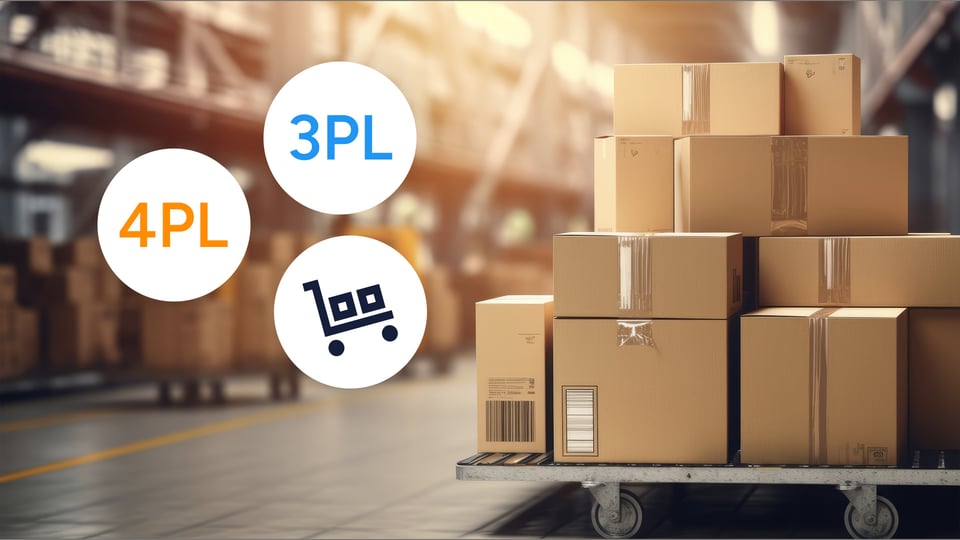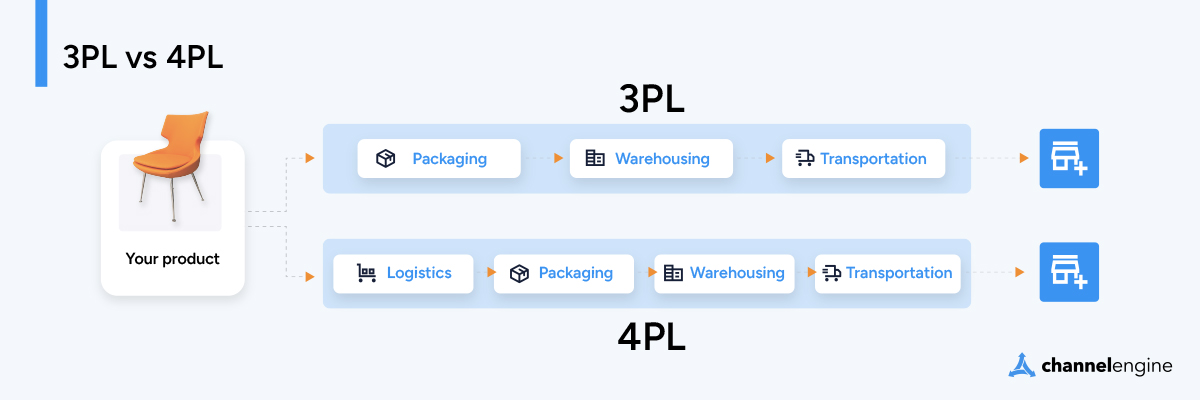3PL vs 4PL: What's best for your business?

Understanding the various supply chain management models is vital for businesses looking to streamline their ecommerce operations, with Third-Party Logistics (3PL) and Fourth-Party Logistics (4PL) being two core options for businesses to explore.
In this article, we'll look into what each term means, their respective advantages and disadvantages, and which types of companies they're best suited for.
What is a 3PL provider?
A third-party logistics provider (or 3PL for short) is an organization specializing in logistics and supply chain management, offering businesses an all-in-one solution for order fulfillment services such as storing inventory, integrating online shops into systems, handling order placement to picking, packing and shipping processes, as well as reverse logistics through their proprietary warehouse management software.
3PL warehouses prioritize speed and efficiency to help improve your operations, scaling to handle increased volume without needing additional staff. They collaborate with you to secure cost-effective shipping rates with expedited delivery for efficient logistics management. When working with 3PLs for ecommerce fulfillment needs, they offer expert knowledge from supply chain specialists and dedicated support from account executives.
What is a 4PL provider?
A 4PL represents an advanced level of logistics management compared to 3PLs. A 4PL will not only handle 3PL services for their clientele. 4PL can also take an active role in overseeing and optimizing all aspects of supply chains, from initial resources to infrastructure needs.
While a 3PL serves as the workforce for logistics operations, 4PLs take on more of an advisory role by overseeing your entire logistics puzzle. They provide more holistic insights than daily operational services as they evaluate how each logistical component fits together seamlessly.
Engaging a 4PL service provides you with one point of contact for all your supply chain needs, providing comprehensive management for everything from warehouses and courier services, freight forwarders, and customs agents - everything needed for transporting products between different points in time and space.
4PLs take an integrated approach to supply chain management, helping synchronize it all and provide in-depth analyses of its overall efficiency and profitability. Their specialty lies in strategy, project management, and analysis services for businesses to streamline operations while reducing costs effectively.
Amazon is the leading ecommerce example of a 4PL model. They provide comprehensive services on one platform, including warehousing, transportation, and inventory management.
We can summarize the difference between 3PL and 4PL into four core areas.
- A 3PL provides day-to-day logistics management, while 4PLs take an expansive view of all components involved in a supply chain, considering each element as needed.
- While 3PLs focus on daily operations and getting products out to their respective customers, 4PLs consider ways to integrate and optimize all aspects of supply chains from beginning to end.
- As part of your supply chain, 3PLs may serve as a point of contact while 4PLs strive to become your single point of contact, streamlining multiple logistics services into one seamless system.
- 3PLs tend to own their warehousing and courier contracts that they share with clients, while 4PLs don't own assets directly; instead, they provide expertise for management, analysis, and optimization services to clients.

Choosing the right solution
When selecting the optimal logistics solution for your business, understanding the advantages of one option over another is vital. Each option offers distinct benefits, and we'll now look into the advantages of choosing 3PL over 4PL.
Advantages of choosing 3PL over 4PL
Control
3PLs allow your company to retain more direct control over supply chain operations. Your team can make immediate decisions to address immediate needs with prompt responses, while 4PLs may prioritize longer-term strategies.
Cost-effectiveness
3PLs can often prove more cost-efficient, as you can choose and pay only for services you require versus being tied into comprehensive service packages with 4PLs, which often provide a one-size-fits-all approach.
Customization
While 4PLs provide more holistic approaches, 3PLs offer logistics processes matching the needs of each business. By working closely with a 3PL, your business can develop logistics processes explicitly tailored to your requirements.
Flexibility
3PLs offer more agility for making quick decisions and responding quickly to market changes. 4PLs may not offer this same degree of agility.
Advantages of choosing 4PL over 3PL
Supply chain optimization
4PLs aim at the long-term efficiency of your supply chain. While 3PLs might meet immediate needs, 4PLs seek to enhance processes and performance over time.
Operational clarity
4PLs provide an in-depth view of operations, making it easier to spot opportunities for improvement. 3PLs may focus more on individual tasks without offering this level of insight.
Communication efficiency
4PL providers simplify communication by acting as one point of contact for various aspects of your supply chain. In contrast, 3PL providers may require managing relationships with multiple vendors, creating potential communication challenges.
Expertise
4PLs can bring considerable expertise in strategy, project management, and analysis that can bring substantial operational improvements. 3PLs may not offer as much strategic input, focusing more on carrying out tasks than providing advice or input.
Types of companies suited to 3PL Services
Small to medium businesses frequently find 3PL services an invaluable solution when resources are stretched while expanding. This is particularly pertinent to ecommerce businesses that rely on 3PL providers for warehousing, order processing, and distribution. 3PLs help fill customer orders efficiently while increasing customer satisfaction, giving these smaller enterprises time to focus on core operations.
Businesses experiencing rapid expansion rely on 3PL services to efficiently scale up. These providers have the expertise and infrastructure to handle increased order volumes without significant upfront investments. Furthermore, those searching for cost efficiency may benefit from 3PL partnerships. The knowledge and resources enable them to negotiate lower shipping rates while improving operational efficiencies.
Types of companies suited to 4PL services
Large enterprises with complex supply chains and extensive logistical needs look to 4PLs for strategic oversight and comprehensive services. Their expert management of intricate networks and ability to offer tailored solutions make them the go-to choice among organizations with extensive logistical needs.
Companies seeking total supply chain control will often utilize 4PL support. These enterprises seek complete visibility and control over their supply chain operations. 4PLs serve as central points of contact, providing holistic views of operations while facilitating seamless logistical integration - something large corporations with complex supply chains need.
Businesses seeking long-term optimization and implementing strategic plans are well suited to 4PL. These service providers specialize in devising strategies that enhance efficiency and profitability over time, aligning perfectly with organizations looking to strengthen their future competitiveness.
4PL services provide companies that require seamless communication among their logistics partners with an intermediary service to manage relationships between various logistic entities. They act as one central point of contact to ensure efficient communications and coordination, thus improving overall logistic processes.
Final words
Logistics requires careful consideration when choosing between 3PLs and 4PLs. 3PLs offer optimal solutions for smaller companies seeking to optimize order fulfillment processes with dedicated partners. 4PLs provide all-encompassing logistics support suitable for rapidly expanding companies that sacrifice some control for comprehensive logistic support.
Understanding your logistics requirements and selecting an effective model can be crucial in meeting today's dynamic business environment. Whether it be 3PLs or 4PLs, the choice must align with your company's current stage and future growth objectives.
Speak to a team of experts and get your custom demo today.


